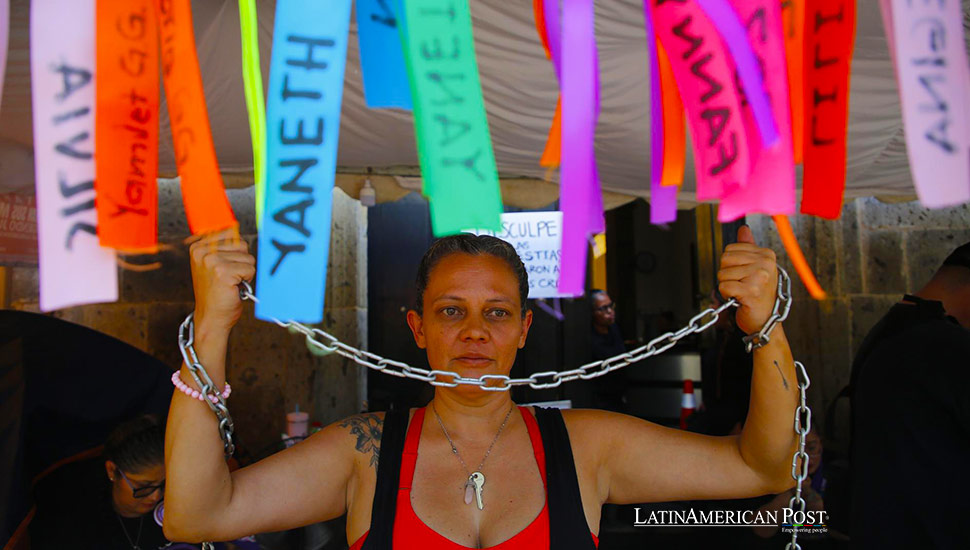Women Demand Action Against Child Custody Abuse in Mexico’s Jalisco

A group of women in Jalisco, Mexico, who have suffered from vicaria violence—a form of abuse where children are used to hurt their mothers—are staging a hunger strike and chaining themselves to demand the approval of a law protecting their children from abusive ex-partners.
In Jalisco, Mexico, a group of brave women are taking drastic measures to demand change. They have suffered from vicaria violence, a form of gender-based violence where children are used as tools by abusive ex-partners to inflict pain on their mothers. Their voices need to be heard, and their fight for justice and protection must be recognized.
The women, members of the organization “Madre yo sí te creo,” have chained themselves and begun a hunger strike outside the Jalisco State Congress. The organization’s founder, Nato Montes, explained that desperation drove their actions. “It was the exhaustion and indifference of the deputies,” she said, highlighting the two-year delay in the state Congress, which has stalled the approval of a critical law designed to prevent children from being retained by abusive ex-partners.
Despite national recognition of vicaria violence as a crime in 2023, Jalisco remains one of eight states without specific state legislation to combat this abuse. The delay and lack of legislative action have left many women and children vulnerable to continued abuse and manipulation by their ex-partners.
The Impact of Inaction
Vicaria violence, also known as child custody abuse, is a particularly insidious form of abuse. It uses the bond between mother and child as a weapon, causing immense psychological and emotional harm. Montes emphasized the importance of passing the law, stating, “The state and its institutions must protect those who decide to end a life of violence with their partners and guarantee their rights to cohabitation and the care their children deserve.”
The absence of this legislation teaches women that reporting violence could lead to the loss of their children, thus perpetuating the cycle of abuse instead of eradicating it. The current legal void leaves mothers in a precarious position, often punished for seeking help and protection.
The women on hunger strike have endured various forms of violence—physical, economic, patrimonial, and psychological. They recount heart-wrenching stories of their children being taken from them through deceitful means, often with the collaboration of judges who issue rulings without a gender perspective.
Chantal Jaime, one of the protesters, has not seen her children since February. Her ex-partner took them while she was ill, and institutions like the Women’s Justice Center refused to help. “We seek protection for ourselves and our children,” Jaime said. “Every time we go to an institution, they tell us nothing can be done because he is their father. We need a law that defends us, ensuring that aggressors and violent individuals do not have rights over our children.”
A Historical Context
The struggle of these women is not an isolated event but part of a broader historical context of gender-based violence and the fight for women’s rights in Latin America. For decades, women in the region have battled against deeply entrenched machismo and systemic discrimination. The feminist movements of the 20th century laid the groundwork for recognizing and combating various forms of gender violence, but progress has been uneven and slow.
In Mexico, the recognition of femicide as a specific crime in 2012 marked a significant step forward. However, new forms of gender violence, such as vicaria violence, continue to emerge, highlighting the need for ongoing legislative and societal changes. The current movement in Jalisco continues this long-standing fight for justice and equality.
The women’s protest also highlights the failures of the institutions meant to protect them. Organizations like the Women’s Justice Center have been criticized for their inaction and lack of support. Montes and her fellow activists demand accountability and effective measures from these institutions. They argue that with proper enforcement and support, laws are meaningful.
The protesters have been on hunger strike for seven days, subsisting only on serum, water, and coconut water. They are determined to continue their protest until the Jalisco Congress takes action. They have also conducted noisy demonstrations, banging pots and pans to draw public attention to their cause.
The Need for Comprehensive Legislation
The proposed law in Jalisco is not just about punishing abusers; it is about creating a framework for protecting victims and ensuring that children are not used as pawns in abusive relationships. This legislation is vital for breaking the cycle of abuse and providing a safe environment for children to grow up in.
By approving this law, Jalisco would be taking a crucial step towards aligning with national standards and fulfilling its obligation to protect its citizens. It would send a clear message that the state does not tolerate gender-based violence in any form and is committed to safeguarding the rights and well-being of women and children.
The voices of these women must be heard. Their experiences and demands highlight a significant gap in the legal and institutional framework meant to protect them. Their courage in standing up against a system that has failed them deserves recognition and support.
Latin America has a rich history of women’s movements that have brought about significant changes. From the suffrage movements of the early 20th century to the contemporary battles against femicide and domestic violence, women in the region have continually fought for their rights. The current protest in Jalisco is a continuation of this legacy, a testament to the resilience and determination of women to achieve justice and equality.
A Call to Action
The hunger strike and protests in Jalisco are a call to action for lawmakers, institutions, and society as a whole. They are a plea to recognize the severity of vicaria violence and take concrete steps to address it. The women of Jalisco are demanding not just legal changes but a cultural shift that values and protects women’s rights and well-being.
Their fight is not just for themselves but for future generations. They aim to create a safer and more just society for their children by pushing for this legislation. It fights for the fundamental right to live free from violence and fear.
The protest by women in Jalisco against vicaria violence is a powerful reminder of the ongoing struggle for women’s rights and protection in Latin America. Their demand for a specific law to address this issue is a call for justice and a plea to recognize their suffering.
As they continue their hunger strike and protests, lawmakers and institutions must listen to their voices and take decisive action. The approval of the vicaria violence law in Jalisco would be a significant step towards ensuring that women and children are protected from abuse and that perpetrators are held accountable.
Also read: Biden’s New US-Mexico Border Asylum Ban Faces Challenges
This fight is part of a broader movement for gender equality and justice in Latin America. By supporting these women and their cause, society can move closer to a future where all individuals are valued and protected and where women’s rights and dignity are upheld.




